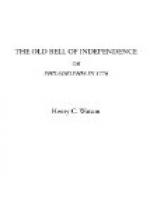“Of course, Murray and Lester lived through the war, went home to the banks of the Lehigh, and married the girls they loved,” remarked Wilson.
“They did; and two very happy couples they made. Jane Hatfield had always been a republican in sentiment, and she loved Lester more than ever when she heard he had dropped toryism as something that would have burnt his fingers if he had held on to it,” replied Morton.
THE TIMELY RESCUE.
“When Mr. Morton commenced his story,” said old Harmar, “he said there was considerable love-stuff mixed up with it, as if that was an objection to his telling it. Now I can tell you a story of which love and fighting are the elements. The events occurred up here in New Jersey, and are true to the time and the people that acted in it.”
“No matter if it was all made up of love, if it illustrated the character of the time, I should like to hear it,” remarked Mr. Jackson Harmar.
“And so should I,” added his wife.
“Is it that story about Captain Edwards and Miss Williams, that Bill Moore used to tell?” inquired Higgins.
“That’s the affair; and, supposing you folks will wish to hear about it, I shall proceed. Shortly after the surrender of Burgoyne, two horsemen were riding along the road which leads to the town of Ridgefield. One was Captain Edwards, and the other Lieutenant Brown. Their conversation partook of the spirit of the period. They were discussing the relative merits of General Gates and General Washington. Brown thought that Washington was deficient in energy, while Edwards thought him a model general, and Gates deficient in both energy and skill. They could not agree, and so they dropped the subject.
“As the colloquy ended, the horsemen spurred onward, and soon arrived in view of the residence of Mrs. Williams, which was situated on a gentle acclivity, accessible by a long avenue, skirted on either side with tall poplars, and entered at the extremity by a slight wooden gate. On entering this avenue, old Pompey came running towards them with a brow darkened a number of shades by his agitation, and grasping the bridle of Captain Edward’s horse, exclaimed:
“‘Oh! for Heaven’s sake, good master Edwards, don’t go to the house!’
“‘What the devil’s the matter?’ ejaculated the captain, as he endeavored to disengage the hold of the negro.




